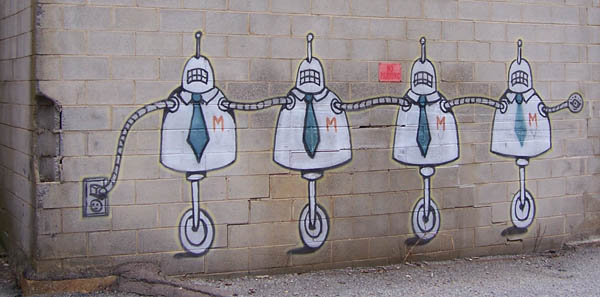…was an interesting question, and there was a panel, moderated by Melanie Shane, where that very question was discussed for 40 minutes during the Northside Festival in Williamsburg.
Shane’s opening salvo: “AI is the last great thing humans will create. Will they be friend or foe?”
Michael Solana @micsolana from @FounderFund opened with a bit of history about how humans interpreted AI.
- The 1950-60 is was all about happiest and AI building a better world.
- The 1970’s-80’s everything will be destroyed by AI (movies such as Terminator and Jurassic park were released).
Which started the discussion about Hollywood, and how they can create fear in their movies. We saw it with Jaws and the sea, are they putting a negative spin on AI because it sells seats?
Robbie Allen from @automatedinsights, which uses massive amounts of data and turns them into stories through AI, agreed with Solana.
“We need to be techo optimistic,” he said, “Do we care if something is automated?”
The general consensus was no, but that it needs be cited when something is automated: people want to be in the know.
David Rose from the @MIT Bio Lab, opened with, “I drove my electric car down to Brooklyn today,” and when someone aske,d which one? He replied, “the one you want,” and that AI can be used in small amounts, in positive ways that aren’t overwhelming. He used his electric car as an example – automatic windscreen wipes, computer vision. These are things we are accustomed to and don’t even realize that there is AI behind them, but that they do make our lives that make easier.
Next question: why do we fear it? Should we? And a great point made by Solana:
“It’s not AI that we should be worried about,” he said, “it’s the humans who can use for bad things!’
The conversation then jumped into job loss from AI, and how humans will be affected.
“Take tractors,” said Rose. “Once they were invented, they displaced labor in the fields, but moved mankind forward in leaps and bounds.”
“We can do this with any industry. with AI,” Solana added. “Take a repeating task and automate it.”
So what does this mean for the future?
“We can then do the jobs we want!” he suggested.
But is that going to be the case? A crowd question pushed this further: AI is going to help the privileged, but what about the lower social economic class? Being a truck driver is a very popular occupation right now, so what is going to happen to them when company turn to the automated truck? I guess we will see…
I personally feel that the question that wasn’t asked and needs to be is: How is AI going to lesser the income gap rather than keep expanding it?
Is AI, friend or foe? I guess only time will tell.
What are your thoughts?
Image credit: CC by Justin Morgan




